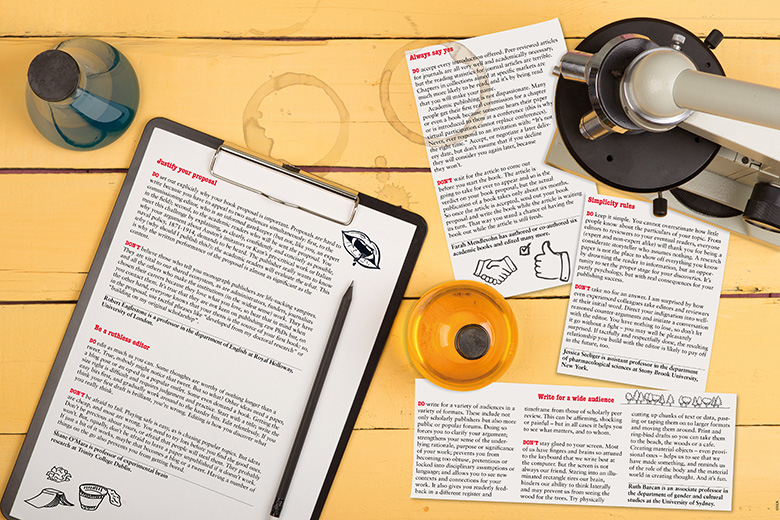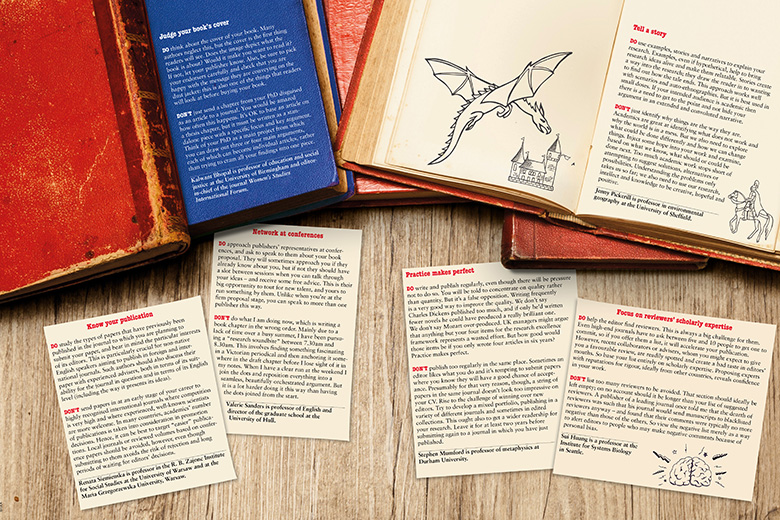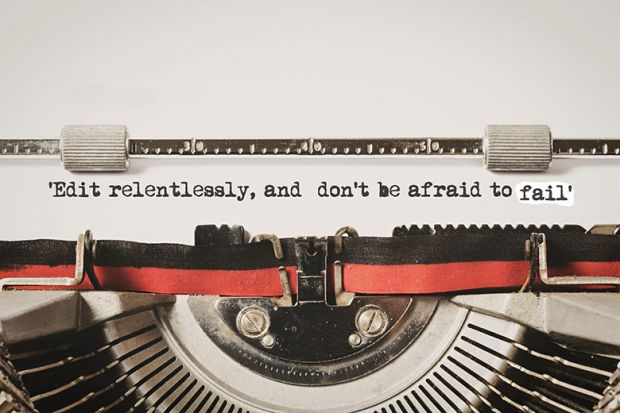Write clearly
DO say what you mean and mean what you say. Biology is hard because it is complex. Every paper is a distillation of a set of simpler messages that can be said to unravel this complexity. You are plotting a route through this complexity for the reader and you have to make that clear. Clarity is the watchword throughout. Having an infographic (a larger version of a graphical abstract) as your first figure can help a lot. Clearly written abstracts, an attention-grabbing opening sentence in the introduction, uncluttered figures and full figure legends are all key.
DON’T assume that the reader understands the field as well as you do. People will give up if your paper contains too much jargon and hidden assumptions, fails to use modern methods of data visualisation and hides the main messages by inverting the logical order or burying them in the results. Nothing much beats a message that goes (roughly): “Before this paper, folk believed X; our data (and literature analysis) show Y; now we need to believe Z.”
Douglas Kell is research professor of bioanalytical science at the University of Manchester and was chief executive of the UK’s Biotechnology and Biological Sciences Research Council between 2008 and 2013. His h-index at Google Scholar is 100.
Choose your editors wisely
DO what you can to make sure you work with a great editor. The name and reputation of the publisher means very little if the commissioning editor has the energy and momentum of a Venus flytrap on a vegetarian diet. You will write and publish a better book if the editor is talented, innovative, brave and thorough. The publishing industry is volatile, so the great editors move to where they have space to be creative and freedom to be intellectually innovative. Follow them. A great commissioning editor can change your life.
DON’T tolerate shoddy sub-editing. I have worked with sub-editors that shine my prose like the Spirit of Ecstasy on a new Rolls-Royce. These men and women make me a better writer because they connect my words with a readership. But I have also worked with some shockers. University presses in particular tend to have a “go to” group that is rarely disrupted by international competition, talent levels or fear of losing their jobs. The more international the publisher, the more international the sub-editors. To preserve your sanity, ask the sub-editor to work on one chapter, rather than the entire manuscript, and return it to you. You can then check their editing style and how it aligns with the goals for your book.
My worst example of a bad sub-editor was a gentleman waiting for the revolution. Operating in a Trotskyite splinter cell (of one) in Perth, Western Australia, he attempted to transform a book on popular music into a passionate exposé on the human costs of post-industrialism in the modern city. He was the PhD student of one of the academic editors, so received all the editing roles for this small university press. Within a week, I complained to the editor. Her reply was: “He’s a really bright guy. Give him a chance.”
Like the permanent revolution, he continued, and with even more aggression since my complaint. When the Trotsky references started to appear in a chapter on the band The Triffids, I told the editor that the book was being destroyed. All his “corrections” were then removed, a new sub-editor appointed, and the editing was completed in six days.
Tara Brabazon is dean of graduate research and professor of cultural studies at Flinders University, Adelaide.
Anchor your subject discipline
DO develop a disciplinary anchor to stabilise your identity and expertise, even if your work is inherently interdisciplinary. Keywords guide your editors and reviewers as to your specialisms, as well as harness you to your home. In publications on utopian studies, travel writing, postcolonial studies, world literatures, gastronomy, and contemporary French and francophone literatures, my keywords will always include my disciplinary anchor of “French”. Profiling your disciplinary anchor and gaining recognition for your particular perspective can make you the “go to” person across several fields – to write for Cambridge Companions, speak at scholarly and public gatherings or do media commentary. It’s also vital to maintaining coherence in an interdisciplinary publication record, and achieving institutional validation.
DON’T do it alone. Interdisciplinarity can sometimes take you out of your comfort zone in terms of keeping up with cutting-edge theories, or understanding practical examples. So it can often make sense to reach out to an expert in the fields you are unsure about. For example, I might work with an economic historian to co-author a paper on the 16th-century Bordeaux wine trade. You’ll probably get two publications out of it, each with different yet complementary interpretations of the datasets. Rather than diluting your intellectual identity, collaboration across disciplines strengthens it, ennobling your contribution to both fields and bringing forth the delights of new discoveries to a wider readership for both collaborators.
Jacqueline Dutton is an associate professor of French studies at the University of Melbourne.
Put your work in context
DO make it immediately clear where your work sits in relation to others. It is crucial for all journals – and, indeed, all readers – to understand the work’s utility and its role as part of a larger communal intellectual project. We like to think of it as our work standing alone, but it is only as part of something bigger that it takes on real value. Put simply, make sure it is clear where the work is coming from and where it has the potential to lead.
DON’T dwell on insignificant details. When we spend large amounts of time on aspects of research, the temptation is that this should translate into word count in the final article. If we have suffered, our psychology dictates that the reader should suffer too. But this is misguided. You spend time and energy so that others don’t have to. There is no need to document in some historical fashion every research avenue you pursued.
David Berman is professor of theoretical physics at Queen Mary University of London.
Listen to your reviewers
DO obsess over reviewer comments when you are making revisions for resubmission to the same publication. Even if some of them seem inane, make the reviewer happy. It almost never pays to disagree with a referee, so don’t do so unless you have the time and willingness to move on to another publisher. From a practical perspective, capable reviewers are typically more valuable to a publication than writers, so editors aren’t motivated to side with you. Remember that being published is usually more important than being right, so save everyone’s time and energy by checking your pride.
DON’T obsess over reviewer comments if your work is rejected – it’s a waste of emotional energy. Reviewers are idiosyncratic and not infallible. It’s also possible to have reviewers who aren’t a good match for your work. I have had reviewers in the same round of peer-reviews make opposite and mutually exclusive recommendations. But, before submitting to another publication, try to address any criticisms that multiple reviewers have made, and resolve any obvious inconsistencies they point out.
Darren L. Linvill is an assistant professor in the department of communication at Clemson University in South Carolina.

Justify your proposal
DO set out explicitly why your book proposal is important. Proposals are hard to write because you have to appeal to two audiences simultaneously: first, to the commissioning editor, who is an informed gatekeeper (but not, like you, an expert in the field); second, to the academic readers who will be sent the proposal. You meet this challenge by explaining, as clearly, confidently and concisely as possible, why your argument about Austen’s imitators or Kant’s pre-critical work or Italian naval policy, 1871-1914, demands to be heard. The publisher really wants to know why (why should I publish this?): the academic readers will evaluate the what. This is why the written performance of the proposal is almost as significant as the content.
DON’T believe those who tell you monograph publishers are life-sucking vampires. They are vital to our shared ecosystem, as are administrators, funders, journalists and all the others who make the institutions (in the widest sense) work. They have chosen their careers because they love what you love, so bear that in mind when you contact them. It’s true that they are not keen on publishing raw PhDs but, on the other hand, everyone knows that your thesis is the source of your first book: so, in the proposal, use tactful phrases like “developed from my doctoral research” or “building on my original scholarship”.
Robert Eaglestone is a professor in the department of English at Royal Holloway, University of London.
Be a ruthless editor
DO edit as much as you can. Some thoughts are worthy of nothing longer than a tweet. True, nobody might notice that tweet. But so what? Other ideas need a paper, a blog post or an op-ed in a popular outlet. Some even demand a book. Getting the size right is difficult and requires judgement and practice. Start with a title; write the easy bits first, and gradually work around to the harder bits. Edit relentlessly. If you think your first draft is brilliant, you’re wrong. Editing is how you discover what you really think.
DON’T be afraid to fail. Playing safe is easy, as is chasing popular topics. But ideas are cheap, and most are wrong. You need to try lots before you find the good ones. Don’t be precious about yours, or afraid that people will steal them. They probably won’t. But, equally, don’t be afraid to leave a paper unpublished if it doesn’t work. If just a bit of it works, maybe that becomes a blog or a tweet. Having a number of things on the go also prevents you from getting bored.
Shane O’Mara is professor of experimental brain research at Trinity College Dublin.
Always say yes
DO accept every introduction offered. Peer-reviewed articles for journals are all very well and academically necessary, but the reading statistics for journal articles are terrible. Chapters in collections aimed at specific markets are much more likely to be read, and it’s by being read that you will make your name.
Academic publishing is not dispassionate. Many people get their first real commission for a chapter or even a book because someone hears their paper or is introduced to them at a conference (this is why virtual participation cannot replace conferences). Never, ever respond to an invitation with: “It’s not the right time.” Accept, or negotiate a later delivery date, but don’t assume that if you decline they will consider you again later, because they won’t.
DON’T wait for the article to come out before you start the book. The article is going to take for ever to appear and so is the verdict on your book proposal, but the actual publication of a book takes only about six months. So once the article is accepted, send out your book proposal and write the book while the article is waiting its turn. That way you stand a chance of having the book out while the article is still fresh.
Farah Mendlesohn has authored or co-authored six academic books and edited many more.
Simplicity rules
DO keep it simple. You cannot overestimate how little people know about the particulars of your topic. From editors to reviewers to your eventual readers, everyone (expert and non-expert alike) will thank you for being a considerate storyteller who assumes nothing. A research paper is not the place to show off everything you know by drowning the reader in information, but an opportunity to set the proper stage for your discoveries. It’s partly psychology, but with real consequences for your publishing success.
DON’T take no for an answer. I am surprised by how even experienced colleagues take editors and reviewers at their initial word. Direct your indignation into well-reasoned counter-arguments and initiate a conversation with the editor. You have nothing to lose, so don’t let it go without a fight – you may well be pleasantly surprised. If tactfully and respectfully done, the resulting relationship you build with the editor is likely to pay off in the future, too.
Jessica Seeliger is assistant professor in the department of pharmacological sciences at Stony Brook University, New York.
Write for a wide audience
DO write for a variety of audiences in a variety of formats. These include not only scholarly publishers but also more public or popular forums. Doing so forces you to clarify your argument; strengthens your sense of the underlying rationale, purpose or significance of your work; prevents you from becoming too obtuse, pretentious or locked into disciplinary assumptions or language; and allows you to see new contexts and connections for your work. It also gives you readerly feedback in a different register and timeframe from those of scholarly peer review. This can be affirming, shocking or painful – but in all cases it helps you to see what matters, and to whom.
DON’T stay glued to your screen. Most of us have fingers and brains so attuned to the keyboard that we write best at the computer. But the screen is not always our friend. Staring into an illuminated rectangle tires our brain, hinders our ability to think laterally and may prevent us from seeing the wood for the trees. Try physically cutting up chunks of text or data, pasting or taping them on to larger formats and moving them around. Print and ring-bind drafts so you can take them to the beach, the woods or a cafe. Creating material objects – even provisional ones – helps us to see that we have made something, and reminds us of the role of the body and the material world in creating thought. And it’s fun.
Ruth Barcan is an associate professor in the department of gender and cultural studies at the University of Sydney.

Judge your book’s cover
DO think about the cover of your book. Many authors neglect this, but the cover is the first thing readers will see. Does the image depict what the book is about? Would it make you want to read it? If not, let your publisher know. Also, be sure to pick your endorsers carefully and check that you are happy with the message they are conveying on the dust jacket: this is also one of the things that readers will look at before buying your book.
DON’T just send a chapter from your PhD disguised as an article to a journal. You would be amazed how often this happens. It’s OK to base an article on a thesis chapter, but it must be written as a standalone piece with a specific focus and key argument. Think of your PhD as a main project from which you can draw out three or four main arguments, each of which can become individual articles, rather than trying to cram all your findings into one piece.
Kalwant Bhopal is professor of education and social justice at the University of Birmingham and editor-in-chief of the journal Women’s Studies International Forum.
Know your publication
DO study the types of papers that have previously been published in the journal to which you are planning to submit your paper, and bear in mind the particular interests of its editors. This is particularly crucial for non-native English speakers aiming to publish in foreign and international journals. Such authors should also discuss their paper with experienced advisers, both in terms of its suitability for the journal in question and in terms of its English level (including the way it presents its ideas).
DON’T send papers in at an early stage of your career to highly recognised international journals where competition is very high and where experienced, well-known scientists are more welcome. In many countries, academics’ number of publications is taken into consideration in promotion decisions. Hence, it can be best to target “easier” publications. Local journals or reviewed volumes based on conference papers should be avoided, however, even though submitting to them avoids the risk of rejection and long periods of waiting for editors’ decisions.
Renata Siemienska is professor in the R. B. Zajonc Institute for Social Studies at the University of Warsaw and at the Maria Grzegorzewska University, Warsaw.
Network at conferences
DO approach publishers’ representatives at conferences, and ask to speak to them about your book proposal. They will sometimes approach you if they already know about you, but if not they should have a slot between sessions when you can talk through your ideas – and receive some free advice. This is their big opportunity to tout for new talent, and yours to run something by them. Unlike when you’re at the firm proposal stage, you can speak to more than one publisher this way.
DON’T do what I am doing now, which is writing a book chapter in the wrong order. Mainly due to a lack of time over a busy summer, I have been pursuing a “research soundbite” between 7.30am and 8.30am. This involves finding something fascinating in a Victorian periodical and then anchoring it somewhere in the draft chapter before I lose sight of it in my notes. When I have a clear run at the weekend I join the dots and reposition everything into a seamless, beautifully orchestrated argument. But it is a lot harder doing it this way than having the dots joined from the start.
Valerie Sanders is professor of English and director of the graduate school at the University of Hull.
Practice makes perfect
DO write and publish regularly, even though there will be pressure not to do so. You will be told to concentrate on quality rather than quantity. But it’s a false opposition. Writing frequently is a very good way to improve the quality. We don’t say Charles Dickens published too much, and if only he’d written fewer novels he could have produced a really brilliant one. We don’t say Mozart over-produced. UK managers might argue that anything but your four items for the research excellence framework represents a wasted effort. But how good would those items be if you only wrote four articles in six years? Practice makes perfect.
DON’T publish too regularly in the same place. Sometimes an editor likes what you do and it’s tempting to submit papers where you know they will have a good chance of acceptance. Presumably for that very reason, though, a string of papers in the same journal doesn’t look too impressive on your CV. Rise to the challenge of winning over new editors. Try to develop a mixed portfolio, publishing in a variety of different journals and sometimes in edited collections. This ought also to get a wider readership for your research. Leave it for at least two years before submitting again to a journal in which you have just published.
Stephen Mumford is professor of metaphysics at Durham University.
Tell a story
DO use examples, stories and narratives to explain your research. Examples, even if hypothetical, help to bring research ideas alive and make them relatable. Stories create a way into the research; they draw the reader in to wanting to find out how the tale ends. This approach works well with scenarios and auto-ethnographies. But it is best used in small doses. If your intended audience is academic then there is a need to get to the point and not hide your argument in an extended and convoluted narrative.
DON’T just identify why things are the way they are. Academics are great at identifying what does not work and why the world is in a mess. But we also need to explore what could be done differently and how we can change things. Inject some hope into your work and examine, based on what we know, what should or could be done next. Too much academic work stops short of attempting to suggest solutions, alternatives or possibilities. Understanding the problems only takes us so far; we also need to use our research, intellect and knowledge to be creative, hopeful and positive.
Jenny Pickerill is professor in environmental geography at the University of Sheffield.
Focus on reviewers’ scholarly expertise
DO help the editor find reviewers. This is always a big challenge for them. Even high-end journals have to ask between five and 10 people to get one to commit, so if you offer them a list, it will accelerate your publication. However, recent collaborators or advisers, whom you might expect to give you a favourable review, are readily spotted and create a bad taste in editors’ mouths. So base your list entirely on scholarly expertise. Proposing experts with reputations for rigour, ideally from other countries, reveals confidence in your work.
DON’T list too many reviewers to be avoided. That section should ideally be left empty; on no account should it be longer than your list of suggested reviewers. A publisher of a leading journal once told me that the dearth of reviewers was such that his journal would send manuscripts to blacklisted reviewers anyway – and found that their comments were typically no more negative than those of the others. So view the negative list merely as a way to alert editors to people who may make negative comments because of personal bias.
Sui Huang is a professor at the Institute for Systems Biology in Seattle.
Settle for imperfection
DO write it up. Every paper has a home, and if you don’t write it, no one else will. The writing process clarifies ideas, identifies gaps and suggests key experiments. You may be doing the best research in the world, but work unpublished is effectively work undone. Knowing when to stop is critical. Careers falter on lack of publications and there are many roadblocks to getting your work published: don’t let one of those roadblocks be you.
DON’T aim for perfection. Yes, the work has to be of a high standard, but no paper will ever hit perfection, and aiming for it will only delay publication. I like to use the unlikely analogy of rifle cleaning. No matter how much of it you do, the inspecting officer can always find hidden dirt. It is the same with papers. Better to leave a fixable hole and get published than to get scooped aiming for the moon.
John Tregoning is senior lecturer in the mucosal infection and immunity section of virology at Imperial College London.
Want more?
How to get published as a postdoctoral researcher
How to write (and publish) like a pro
Register to continue
Why register?
- Registration is free and only takes a moment
- Once registered, you can read 3 articles a month
- Sign up for our newsletter
Subscribe
Or subscribe for unlimited access to:
- Unlimited access to news, views, insights & reviews
- Digital editions
- Digital access to THE’s university and college rankings analysis
Already registered or a current subscriber? Login




